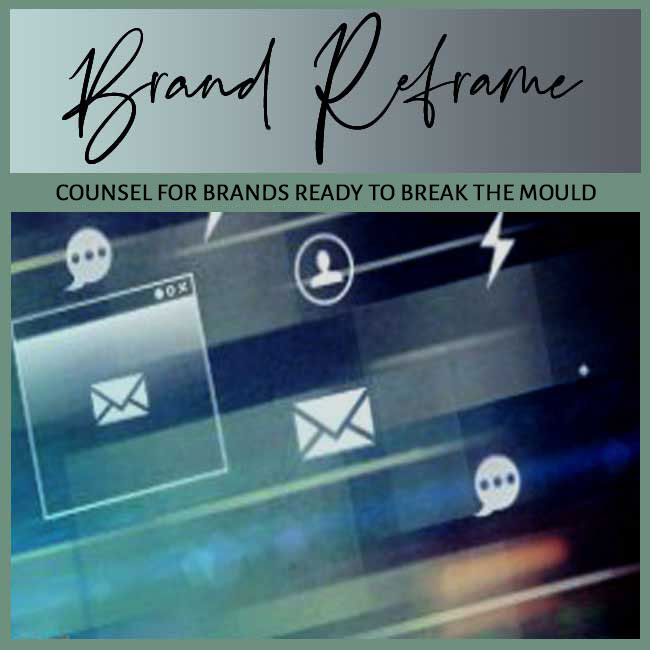
FOCUS: BRAND RELEVANCE LOSS | AUDIENCE: STEWARDS OF PLATEAUED BRANDS
BY: SHOBHA PONNAPPA | BRAND BREAKTHROUGH STRATEGIST | 45 YEARS | 125+ CLIENTS
I answer 6 tough questions about how legacy brands lose relevance when cultural context evolves … and how to reposition messaging.
Many legacy brands built their reputation in a different era … one with different norms, values, aspirations, and language. Over time, those same messages that once struck a chord can now feel out of touch or even tone-deaf. I’ve seen brands lose emotional traction not because their product declined, but because the world around them shifted. In this post, I tackle six pressing questions around how cultural shifts create silent distance … and how to respond with agility and integrity.
Culture isn’t static … it evolves with every generation, movement, and global event. When the social climate shifts, brand messages anchored in outdated assumptions can feel irrelevant or alienating. A slogan once celebrated as bold might now sound insensitive or exclusionary. Even product benefits once tied to traditional norms … like gender roles or status markers … may now trigger discomfort, not desire.
What was once aspirational may now feel out of sync. When a brand doesn’t evolve alongside culture, it quietly becomes invisible … not through rejection, but through disconnection. Audiences don’t attack it … they just stop seeing it as for them. This slow fade is often more dangerous than backlash.
The signs are subtle at first. Campaigns that used to drive response now feel flat. Social engagement drops without an obvious reason. Focus groups or online feedback contain phrases like “dated,” “out of touch,” or “not for me.” Meanwhile, newer entrants in your category seem to hit the emotional mark more easily.
You may still have visibility, but not vitality. If your message hasn’t been examined through a cultural lens in the past 3–5 years, chances are you’re behind … even if your product hasn’t changed. Regular brand audits can prevent this silent drift.
The three biggest offenders are tone, terminology, and assumptions. Brands that once relied on “authority” or “prestige” messaging may now sound elitist. Others that used stereotypical roles in ads … especially around gender, class, or ethnicity … can come across as regressive. Even seemingly neutral phrases like “family-friendly” or “traditional values” carry new connotations in polarised times.
Language is never neutral … it’s always evolving. If your tagline, brand story, or packaging hasn’t been culturally audited, you might be projecting an image you didn’t intend. A simple audit can often reveal misalignments you’ve overlooked.
Yes … if it roots its update in deeper truth, not trend-chasing. The goal isn’t to become something you’re not, but to express your essence in ways that resonate now. This might mean changing vocabulary, refreshing visuals, or elevating overlooked aspects of your brand story that feel more inclusive, timely, or emotionally resonant.
Relevance doesn’t require reinvention … it requires reframing. Brands that stay anchored to their purpose but speak in culturally conscious ways gain trust instead of losing it. The soul of the brand remains intact … only the signals evolve.
The key is coherence. Don’t bolt on trending values or causes unless they align with your core. Consumers are highly attuned to insincerity. If your actions, operations, and communications aren’t aligned, cultural updates can feel opportunistic. Internal readiness is just as important as external change.
Modern messaging must match behind-the-scenes integrity. If you’re making claims about inclusion, sustainability, or empowerment, be ready to show how you live them … not just say them. Alignment protects you from both backlash and brand erosion.
Start with a relevance audit. Map your current messaging against today’s cultural dynamics … not just trends, but deeper shifts in values and language. Talk to audiences who’ve drifted away. Review what competitor brands are doing right … or wrong. Then, isolate which parts of your story need revisiting.
Realignment starts with listening, not launching. Before you rewrite a line or design a campaign, anchor yourself in a current cultural reality … one that your audience actually inhabits. This initial research often sparks the most meaningful creative shifts.
If these questions echo what you’re sensing, your brand may be running on historical goodwill … but losing present-day connection. Cultural relevance isn’t about being trendy — it’s about being tuned in. The strongest brands aren’t loudest — they’re the ones that listen first, speak wisely, and shift with grace.
If you’re an investor seeking momentum for your portfolio brands, this FAQ Insight Post I wrote could interest you: “FAQs: When Brand Awareness Grows but Buyer Urgency Doesn’t.“
And if you’re a solo expert looking to sharpen traction, this FAQ Insight Post I worked on may resonate: “FAQs: When Your Expertise Is Always Visible but Rarely Valued.“

"One BIG IDEA can turn brand stagnation into unstoppable movement. Spots are limited each week ... book your breakthrough session now."
Shobha Ponnappa
More Breakthrough Ideas … Case Studies & FAQs … from the Brand Relevance Loss Category
Case Studies
FAQ Insights
Smart insights, real-world frameworks, and idea-driven clarity – designed to help brands move.
Get my fortnightly Brand Reframe newsletter. Smart insights, distilled thinking, and focused momentum to help your brand lead.

Get my free AI strategy guide. Smart prompts, sharper briefs, and practical ways to make AI support your brand momentum.

Just fill in the form to join. Get my newsletter and the guide shown alongside, all with several game-changing tips.